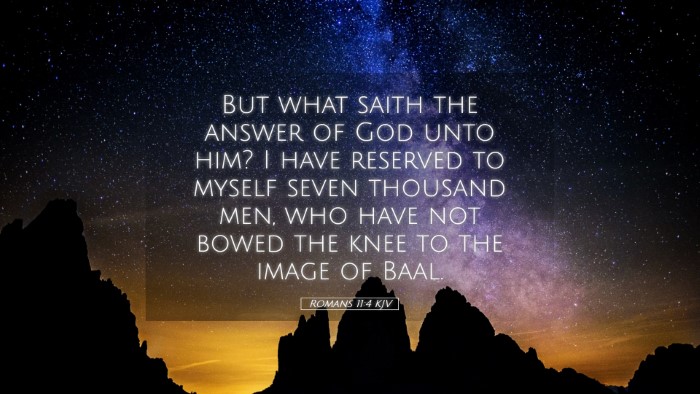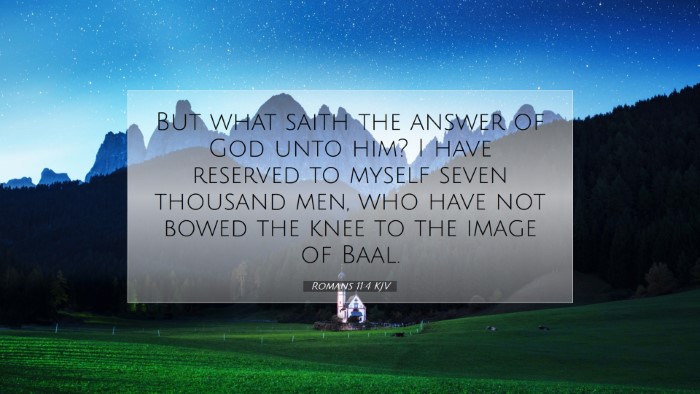Commentary on Romans 11:4
Romans 11:4 states, "But what does the divine response say to him? 'I have reserved for myself seven thousand men who have not bowed the knee to Baal.'" This verse occurs within Paul's discourse regarding the remnant of Israel and God’s sovereignty in preserving a faithful people. Below, insights from notable public domain commentaries by Matthew Henry, Albert Barnes, and Adam Clarke are synthesized for a deeper understanding.
Contextual Background
In Romans 11, Paul discusses the rejection of Israel and the mercy extended to the Gentiles. This chapter is pivotal as it highlights God's faithfulness despite Israel’s unbelief. Paul refers to the historical episode of Elijah and the prophets of Baal from 1 Kings 19:18, illustrating that despite widespread apostasy, God has always maintained a remnant.
The Divine Assurance
Matthew Henry notes that God has not completely cast away His people, emphasizing that divine grace always preserves a remnant. This remnant, represented by the "seven thousand men," serves as a testament to God’s commitment to His covenant and His ability to preserve a faithful lineage amidst moral decay.
Significance of the Number Seven Thousand
Albert Barnes elaborates on the significance of the number “seven thousand.” He remarks that the number symbolizes completeness and divine perfection. This serves to demonstrate that, though the visible church may seem to be in decline, God's hidden elect are never outnumbered or unnoticed in His eyes.
Spiritual Principle
This remnant signifies a spiritual principle that God works through a few faithful individuals rather than the majority. Adam Clarke highlights that this instance shows God’s method of operating in the world, where His purposes are fulfilled through those who remain true to Him, regardless of societal trends.
God’s Sovereignty and Human Response
Paul’s reference to God’s preservation of the remnant offers a robust affirmation of divine sovereignty. Matthew Henry emphasizes that God’s choice is not based on human merit but solely on His grace and purpose. This underscores a central theme in Pauline theology — that salvation is a result of God’s grace and mercy, not human effort.
Consequences of Idolatry
The mention of those who "have not bowed the knee to Baal" serves as a warning against idolatry. Albert Barnes observes that bowing to Baal represented a complete departure from the worship of the true God, highlighting the consequences of abandoning faith in favor of cultural pressures. This remains relevant today where modern idols can take many forms, calling for vigilance among believers.
Lessons for Today’s Church
The remnant concept challenges contemporary Christians to stand firm in their faith, even in a society increasingly hostile to biblical truth. Adam Clarke observes that the call to faithfulness in adversity is timeless and vital for the church today. The lesson is clear: God’s people are called to worship Him purely and faithfully, standing out in a world that may readily compromise.
Encouragement for Believers
For pastors and theologians, Romans 11:4 offers a source of encouragement. Despite the challenges faced by the church, God's provision of a remnant assures us that His purposes will endure. Matthew Henry reminds us that God will raise up witnesses even in the direst of circumstances; this is a means of grace for the weary believer.
Conclusion
In summary, Romans 11:4 serves as a profound reminder of God's sovereignty and faithfulness. The preservation of a remnant ensures that divine purposes will prevail, drawing attention to both God’s grace in election and the call for believers to remain steadfast in their devotion. This passage prompts reflection on today's idolatrous practices, encouraging Christians to remain faithful amid societal challenges. The insights provided by Henry, Barnes, and Clarke shine a light on these themes, offering invaluable reflections for pastors, students, and theologians alike.


